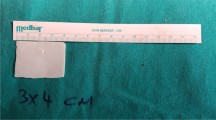Abstract
Introduction
It is usual to stop the intake of oral anticoagulants (anti-vitamin K) before surgery. Some authors have shown that during minimal surgery, the relay with low molecular weight heparin (LMWH) may lead to more thromboembolic complications. We present a prospective comparative study while evaluating the results of stopping or continuing anticoagulants in the surgery for carpal tunnel syndrome.
Material and methods
Our series included 21 patients (24 hands) taking anticoagulants on a long-term basis. For the first nine patients (group I), treatment with anticoagulants was stopped before the surgery. For the following 12 patients (group II), treatment with anticoagulants was not interrupted. The evaluation was based on the measurement of pain (VAS), functional score of the Quick D.A.S.H. and grip strength (Jamar®) and search for a haematoma or thromboembolism).
Results
The pain decreased by 3.5 points in both groups. The Quick D.A.S.H. decreased by 19.9 and 27.7 points in groups I and II, respectively. The average grip strength decreased by 2.5 kg in group I and increased by 3.8 kg in group II. A subcutaneous haematoma that got healed by itself was observed in group II. We did not observe any thromboembolic complications.
Discussion
In conclusion, it seems pointless to stop anticoagulants before surgical treatment of carpal tunnel. The first reason is that continuing anticoagulants does not result in a bleeding risk. The second reason is that this approach removes the theoretical risk of thromboembolic complications during a poorly monitored relay.
Similar content being viewed by others
References
Bezuhly M, Sparkes GL, Higgins A, Neumeister MW, Lalonde DH. Immediate thumb extension following extensor indicis proprius-to-extensor pollicis longus tendon transfer using the wide-awake approach. Plast Reconstr Surg. 2007;119:1507–12.
Douketis JD, Berger PB, Dunn AS, Jaffer AK, Spyropoulos AC, Becker RC, et al. The perioperative management of antithrombotic therapy: American College of Chest Physicians evidence-based clinical practice guidelines (8th edition). Chest. 2008;133:299S–339.
Dunn AS, Turpie AG. Perioperative management of patients receiving oral anticoagulants: a systematic review. Archives of Internal Medicine. 2003;163:901–8.
Katholi RE, Nolan SP, McGuire LB. Living with prosthetic heart valves: subsequent noncardiac operations and the risk of thromboembolism and hemorrhage. Am Heart J. 1976;92:162–7.
Lee SO, Li MJ, Ho HM, Chien CC, Guo SL. Perioperative transient ischemic attack caused by the cessation of warfarin. Acta Anaethesiol Taiwan. 2010;48:188–90.
Malden N. Dental procedures can be undertaken without alteration of oral anticoagulant regimen. Evid Based Dent. 2005;6:11.
Smit A, Hooper G. Elective hand surgery in patients taking warfarin. J Hand Surg Br. 2004;29:204–5.
Conflict of Interest
The authors declare that they have no conflicts of interest, commercial associations or intent of financial gain regarding this research.
Author information
Authors and Affiliations
Corresponding author
About this article
Cite this article
Naito, K., Lequint, T., Zemirline, A. et al. Should we stop oral anticoagulants in the surgical treatment of carpal tunnel syndrome?. HAND 7, 267–270 (2012). https://doi.org/10.1007/s11552-012-9425-1
Published:
Issue Date:
DOI: https://doi.org/10.1007/s11552-012-9425-1




